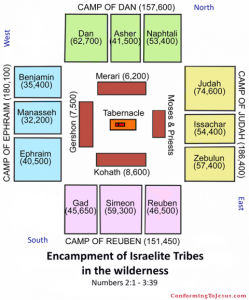As a Messianic Jew I am not liked by anyone. My Jewish brothers and sisters tell me that because I believe “in Jesus” (almost none of them really understand what that means) I am no longer Jewish; on the other side, because I follow Torah (as best as I can) and maintain a “Jewish” worship and lifestyle, my brothers and sisters in Messiah tell me I am legalistic and not really saved because I am “under the law” and not “under the blood.”
Both are just so very, very wrong.
Shaul (AKA Paul, that nice Jewish tent maker from Tarsus) tells us in Romans, Chapter 4 all about legalism and faith. He begins at the beginning, with Abraham, and identifies how the Tanakh confirms that Abraham was considered righteous because he believed what God told him would happen. That faithfulness, demonstrated by Abraham believing in what hadn’t yet happened, was why God credited him with righteousness. There was no task he accomplished, or behavior he performed, other than believing.
But that wasn’t all: Abraham did more than just believe. He did all the things that God told him to do, without hesitation or complaint. He left his father’s house, he left his neighbors, his home…everything he knew and was comfortable with, and took everyone and everything he owned to…he had no idea where.
When God told him to cut up animals and lay them out, he did that and remained out in the heat of the day, shooing away the birds.
When God said to circumcise himself and everyone else, he did it that day.
When God said to take Isaac and sacrifice him, he left early the very next morning.
Whatever God said to do, he did.
So, even though Abraham’s righteousness came from trusting faithfulness in what God said, he also spent his life doing what God told him to do. We call that obedience.
Going back to Romans 4, Shaul points out that circumcision had nothing to do with Abraham’s righteousness because the righteousness was credited before he was circumcised; because of that, Gentiles who are not circumcised can be saved without undergoing the procedure, but if one chooses to do so, as an act of obedience, it doesn’t mean that person is being legalistic.
The difference between legalism and faith is simply the reason for performing the act: if I do what is in the Torah because I want to obey God, that is not legalism. If I do what is in the Torah to make me righteous, I am being legalistic. Of course, if I can obey Torah perfectly, I will be made righteous by doing so; the problem with that scenario is that no one can obey Torah perfectly. Therefore, there has to be a better way. We call that way “Grace”, God’s forgiveness for our sins, which is possible through believing in Yeshua, whose sacrifice replaced the need to bring a sacrifice to the temple in Jerusalem to have our sins forgiven.
This is why Yeshua had to die: because the temple wasn’t going to exist, which means the sacrificial system God created for us in the Torah would no longer be available, Yeshua’s sacrifice replaced needing the temple to receive forgiveness of sin.
If I live my life trying to obey the Torah because it is what God said I should do, and I do it to please God and out of respect for Him, then I am not being legalistic: I am being obedient. Just as Abraham was obedient. Do any of you doubt, even for a nano-second, that if God had given the Torah to Abraham back then, that Abraham would not have tried to be 100% in compliance with everything in the Torah? Of course he would have. And not to be considered righteous, but simply because God told him it is what he should do.
The Torah is NOT just for Jews- it was given to the Jews, who God said are His nation of priests to the world, to live it as best they can in order to be an example to the rest of the world how they should live. If you don’t want to worship the God that is in the Old Covenant writings, then ignore the Torah. But if you choose to ignore God’s commands, for whatever reason, I don’t think we will be playing Cribbage in the Acharit Hayamin (End Days) together.
It all comes down to what is in your heart: believing Yeshua is the Messiah and being faithfully obedient to Torah as a “labor of love” will result in receiving His Grace; obeying Torah just to earn your way into heaven is a direct route to somewhere, but not where you will want to be.

